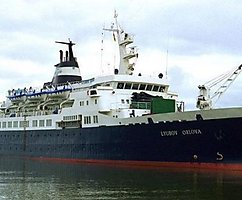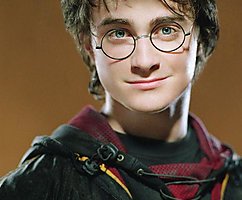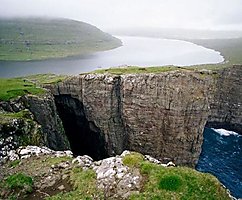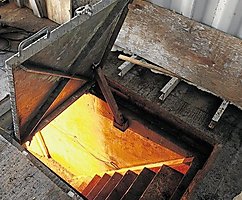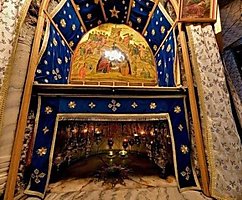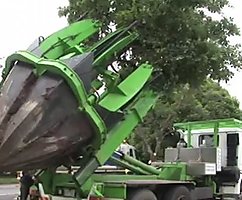Between a rock and a hard place (10 photos)
 Bashny.Net
Bashny.Net
Create riot policemen in the late eighties was rather a forced measure of the Soviet government. New political course of the state on the democratization initiated nationalist unrest in a number of the then Soviet republics. Spurred nationalists, the first Baltic States has attempted to leave the Soviet Union.
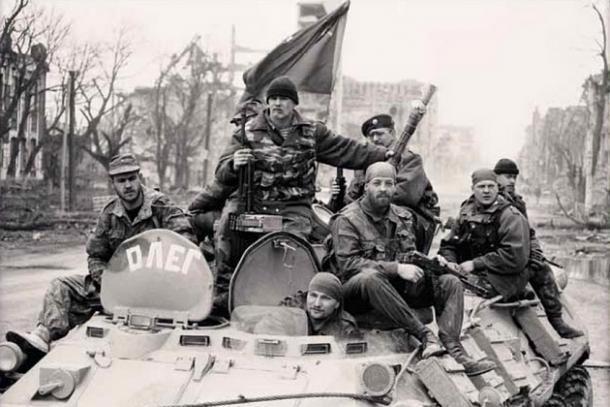
an effort to keep the state in its previous borders, the CPSU Central Committee and the Government have taken specific measures in all the major cities have created special police units.
In October 1988 over the Soviet Union in the capitals of the Union republics appeared 24 special purpose police detachment. From the Baltic republics by some miracle, only the party leadership was able to convince the Estonian Ministry of Internal Affairs of the USSR there is no need to create a riot on its territory, "not to stifle the emerging democracies».
Second December 1988 the order № 206 of the Ministry of Interior of the USSR, including the Ministry of Internal Affairs of the Latvian SSR, Riga OMON was formed, numbering 150 people (including 20 officers and 2 Unverified employee).
Its task was to protect public order in major cities across the country, the elimination of mass disorder, public order during the period of any accidents or natural disasters, and the disarmament of illegal groups. In particular, the units subordinated to the Ministry of Interior the self-proclaimed Republic of Latvia, criminal gangs and arms dealers.
The first commander of the Riga OMON was appointed Lieutenant Colonel Edgar Ivanovich Limar. Previously, he headed the department in LOVDT on water transport of Riga city, and then - the headquarters patrol the city police department. With the formation of the Riga OMON was appointed its commander. About a year and a half after this appointment Edgar Limar retired.
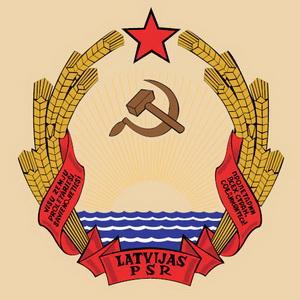
In October 1990, a group of "special police" led by Major G. Czeslaw Mlynnik. Born Czeslaw G. July 28, 1960 in the village of Lugomovichi Grodno region Belarusian. In 1991, he graduated from Minsk Higher School of the USSR Ministry of Internal Affairs. (Veteran of the Afghan war, awarded the medal "For Courage" and "For Military Merit".) Prior to his appointment to the post of commander of the riot police, served as commander of operational troop platoon, and then - senior inspector of combat training.
In fact, the Soviet authorities in the Baltic countries have ceased to exist. But Moscow did not want to recognize the independence of Latvia, Lithuania, Estonia, and it has provoked severe political struggle, which was involved in the Riga OMON. Historians believe the main reason for all subsequent events - dual power, set in Latvia in May 1990.
On the one hand, the legally elected parliament and formed their government. On the other - anti-government coalition: the Communist Party of Latvia headed by the first secretary of Alfred Rubiks, Intermovement, the KGB and the Baltic Military District (its headquarters were in Riga).
Initially supported by a detachment of the new government. May 15, 1990, he became a hero in the eyes of the Latvian people. On this day, the first time the military attempted to overthrow the republican parliament. Staff of the Baltic Military District officers and plainclothes cadets of military schools stormed the parliament building. The government called the riot police, who easily beat back the offensive.
June 18, 1990 from the post of Minister of Internal Affairs was released Lieutenant General Bruno Shteynbrik, who comes from the KGB and member of the Central Committee of the CPL, created a riot police and riot police who could find a common language.
The new Minister of the Republic of Latvia - Police Colonel Alois Vaznis, former chief of the Criminal Investigation Department of the Republic, went on the conflict with the "black berets". Start Cleaning companies, and on a national basis - life in Riga did not guarantee the fighters obtain citizenship. And the Latvian language does not know everything.
The commander of the unit Lieutenant Colonel Edgar Limar Vaznis refused to submit and in the Communist Party newspaper "Soviet Latvia" declared that he would carry out only those orders that do not contradict the Constitution of the USSR and the Constitution of the Latvian SSR.
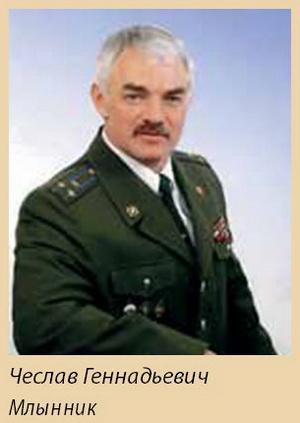
Then the new minister has forbidden to give rebellious riot police put him money, ammunition and fuel, and the Government of the Republic demanded from the Soviet Interior Ministry riot police to disband Riga.
But then-Interior Minister Vadim Bakatin at the request of Rubiks ("take into account the growth of separatist sentiment in the Baltic States") retained the squad reassign its 42 th Division of the Interior Ministry of the USSR (its headquarters are in Vilnius and two regiments - in Riga). Also Makarova guns, riot police were given the permanent wearing of machine guns, grenades, and the squad gave two new APCs.
December 3rd, 1990, the post of Bakatin Federal Minister of the Interior was replaced by former first secretary of the Latvian Communist Party, Boris Pugo. His first deputy was General Boris Gromov, formerly commander of the 40th Army in Afghanistan.
In the troubled times who is not only used police units in larger political games. Between a rock and a hard place and appeared Riga OMON.
In 1990 Latvia still declared independence. In these circumstances, the Riga OMON refused to swear allegiance to the new authorities and Mlynnik said that from now on will be subject only to the Minister of Internal Affairs Boris Pugo. Squad appeared abroad and practically outlawed.
Then in Riga was the representative of the Ministry of Interior of the USSR, to give orders directly to the Minister of Internal Affairs Command special purpose police detachment.
In January 1991, on the orders of the Ministry of Internal Affairs of the USSR and the Central Committee of the Communist Party of Latvia took the riot police and secured the printing house - publishing party, nationalized by the new government of Latvia. There separatists could print flyers and leaflets. The activity of this company was not paralyzed - the police for some time easy to control the printing press.
"In order to restore order and establish Soviet power in Riga, enough of our unit. We are ready to execute any order of the president. We hope that it will be soon - then said reporters riot police senior lieutenant Alexander Kuzmin. - Dispersal of the existing power, take custody of the strategic objects and arrange a trial nationalists ».
The new leadership of the USSR Interior Ministry tried to calm Vaznis, alarmed by the audacity of riot police. January 14, he received a telegram signed by Gromov: "... As you know, the part of the Federal Ministry of the measures taken to strengthen control over the operational activity unit ...»
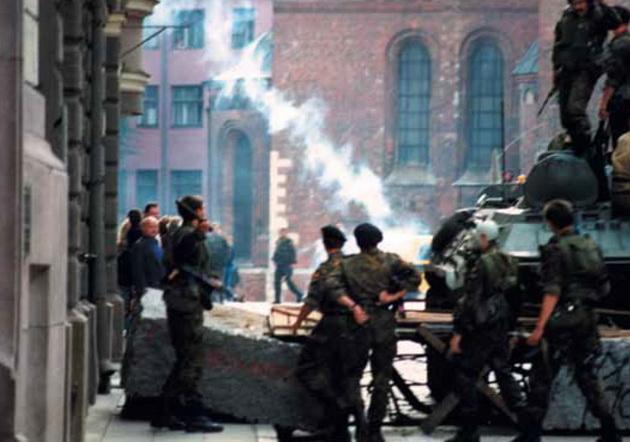
But the same day (15 January), the riot police had disarmed the police station "Vecmilgravis" in Riga, and then the local department of the Minsk Higher School of the Ministry of Interior.
To the alarming situation in reserve Shteynbrik USSR Interior Ministry, he said: "... Such formation as riot police is dangerous for any government. Send commanders appointed from Moscow, riot police did not recognize. Mlynnik enjoys credibility, not characterized by restraint. The detachment is controlled by a special department of the KGB and the Baltic Military District. Their anarchism is dangerous. I do not rule out new attacks. I do not think they have someone's specific instructions, but do not rule out that they may throw out the information, provoking children to certain actions ».
According to the latest investigation began on January 16, riot police, fearing an attack on their base captured "Vecmilgravis" opened fire and accidentally killed the driver a passing car.
January 18 in Moscow took a report signed by Vaznis: "... me all the bodies and organs of Internal Affairs of the Republic of Latvia ordered in the case of intrusion attempts riot in buildings and premises of the Interior to open fire on them to kill».
But two days later riot police seized the building of the Ministry of Internal Affairs of the Republic of Latvia, where everything is stored weapons and documentation of its accounting. In this killed two police officers guarding the arsenal, the studio operator who filmed the incident on videotape, and bystanders.
As old-timers remember the special police, served as a pretext for the seizure of shelling patrol riot attire, riding on a duty shift. Narrow streets, the dark, and that the Bastion Hill, where the fire was fought by riot policemen, were dominating in height, can not effectively defend itself - I had to take a nearby building ... the republican Interior Ministry. During the shooting were a lot of onlookers, and stray bullets could easily catch someone.
Shootout ended as quickly as it began. "Examined - is not at war with anyone. Of collected weapons and left the building ... »
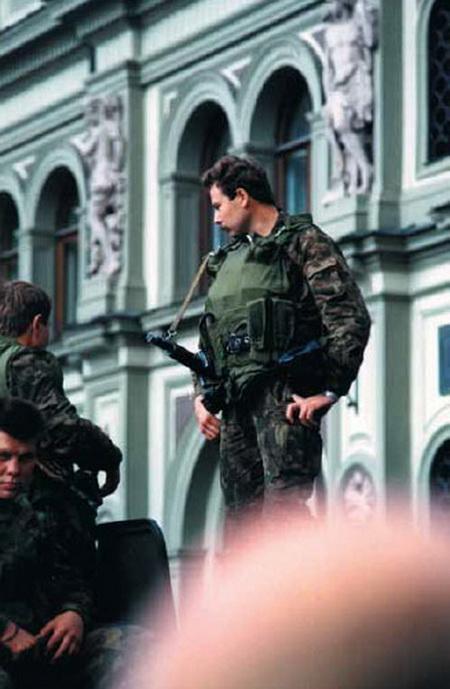
At the peak of the "black berets" in Latvia of the National Police was created Battalion "White Berets". In one of the encounters they surrendered without firing a shot. Riot militiamen disarmed the battalion taking away from the police uniforms, pistols and machine guns.
- Baltic States was actively separatism and created its economic border customs posts, - says the commander of the Tyumen Oleg Sidorchik riot.
Oleg Sidorchik native of Tallinn ... The police, Oleg went by conviction, but by this time in the Baltic States began a campaign of defamation of Russian-speaking population. "Aboriginal" after Russian, which, strictly speaking, kept the entire industry of the republic, are increasingly shouting insulting words and stadiums bawled nationalist songs. This "revolution" historians later called "singing».
- Expected romance PPP was not enough - and wanted to try yourself in the service of the OMON - recalls Sidorchik. Then about these newly created division went incredible rumors. Allegedly selected in the squad, both in space ...
In early 1991, Estonia in agreement with the Ministry of Internal Affairs of the USSR established its police from the actions of the police.
Estonians felt above his dignity to serve in the militia, and it is 90 percent composed of Russian, poor knowledge of the Estonian language. Commanders quietly offered Russian policemen sign paper sheets with obscure texts in Estonian. As it turned out - the oath of allegiance to the new Estonia. Sidorchik Estonian owned and did not rise to the bait.
Then, according to the separatists, open borders with Russia undermined the economy of the new Baltic States, and for their protection were involved Battalion Field Police (police patrol), in which Oleg Sidorchik served in the position of "senior kordnika" (senior patrol police). Refusing to guard the border, and he resigned after a meeting and talks with the Chief of Staff of the Riga OMON Valery Brovkin, in June 1991 she was admitted to the squad ...
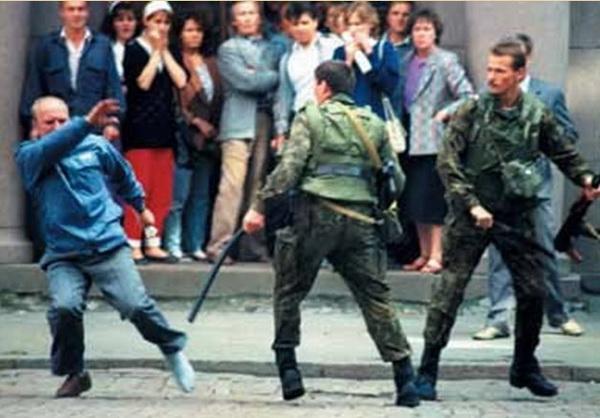
Then the new Latvian authorities accuse the fighters in the shooting of seven Lithuanian customs post Medininkai on July 31, 1991. According to the version of the same investigation, participated in the attack Riga OMON soldiers with the assistance of their colleagues from Vilnius riot police, are also subject to the Ministry of Interior of the USSR.
January 25 about 500 policemen Riga garrison at its meeting in public and political center of the Central Committee of the CPL was supported by riot police and demanded the resignation of Vaznis.
Moscow television showed imbued with sympathy for the Riga OMON film "Our" then popular television journalist Alexander Nevzorov.
As a dedicated Riga OMON
At the beginning of January 1991 a number of senior representatives of the Central Committee of the CPSU and the Soviet government set up a self-proclaimed authority in the Soviet Union - the State Emergency Committee (Emergency Committee), who tried to forcibly remove MS Gorbachev from the post of President of the USSR, held them to change course and to disrupt the signing of the "Treaty on the Union of Sovereign States", scheduled for 20 August 1991, and thus prevent "legal" division of the country into separate states.
Since the end of 1990 and beginning of August 1991 members of the Emergency Committee had intended to introduce constitutional means a state of emergency.
Not having received the support of the president of the USSR and Supreme Soviet of the USSR, since the beginning of August 1991, they adopted unlawful, but concrete measures to prepare for the state of emergency.
Their essence is in isolation from the power of the president of the USSR, blocking possible attempts of the Russian Federation President (Boris Yeltsin) to resist the activities of the Emergency Committee, and the establishment of a permanent monitoring of heads of government of the RSFSR.
Emergency Committee hopes pinned to the aid of the Soviet Army and Interior Ministry special forces to storm the building of the Supreme Soviet of the RSFSR.
Option power to solve the problem of confrontation in Riga conspirators seemed more "successful" than the same test of strength in Vilnius, where on January 12 during the assault on the television station killed 13 people.
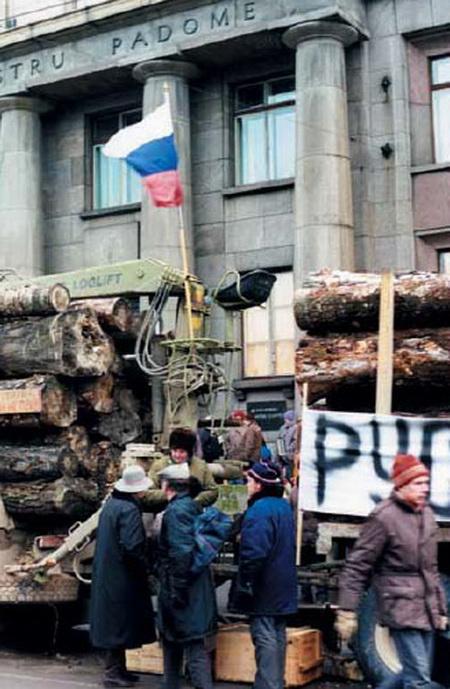
August 19, 1991 in Moscow, began a coup (the so-called "August" putsch), and Interior Minister Boris Pugo ordered the commander of the Riga OMON Czesław Mlynnik restore Soviet order in Riga.
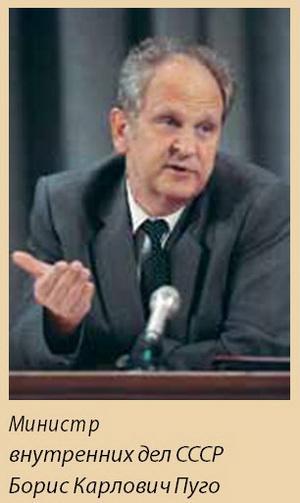
As later recalled Mlynnik, "... on Monday, August 19 at 6 am was ordered Pugo open secret package ... And 8 hours later all the objects belonging to the category of special importance, were completely taken by us under control ...»
"Black Berets" five groups of 10-15 people on several specially sent combat army Mi-8 helicopter landed on the important objects and without firing a shot taken and secured the building of the City Department of Internal Affairs, Ministry of Interior, the television station on the island of Zakusala, long-distance telephone and telegraph station Dzirnavu street and the Latvian Radio Committee at the Dome Square.
On the morning of August 20 riot policemen handed over to take an object and army paratroopers with counterintelligence took up the search for weapons of separatists, but timely information on weapons proved to be false. By the evening of 20 August the Government of Latvia to hide in bunkers bomb shelters and returned to Riga Soviet power.
As a result of the riot police ousted all separatist forces. For two days the soldiers almost without firing a shot took control of all strategic facilities in Latvia. And while none of the separatists did not come out to rallies and demonstrations.
The activists of the Popular Front of Latvia (NFL) were scared and conscientiously fulfill all the orders of "invaders».
August 21 riot policemen were preparing to take control of the last object that was under the control of supporters of the NFL - the building of the Supreme Council of Latvia.
Dressed in a "citizen" and with folding machine guns under clothing riot policemen in groups of three or four people per car looking staffs DNDL ("Movement for National Independence of Latvia") and voluntary nationalist squads "Kartiga HKSAR." At headquarters they seized found nationalist literature and powerful means of communication on the basis of five brand new cars GAZ-66. These machines - mobile station is likely to have been stolen from abandoned military depots "emergency reserve».
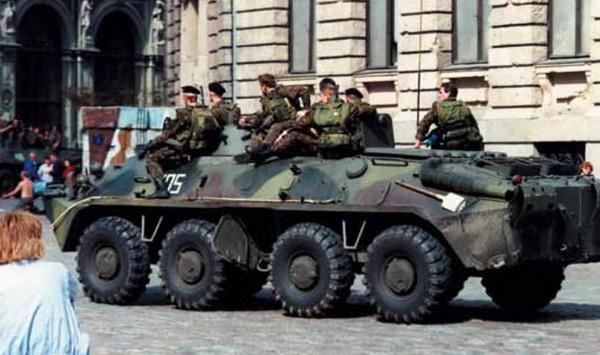
At the headquarters of the special department of the county people he listened intently to the televised speech of Boris Yeltsin - in Moscow, has been all over with the Emergency Committee ...
The same day, Interior Minister Boris Pugo, the USSR committed suicide, and the Riga OMON and military from the Defense Ministry, meanwhile, continued to control the capital of Latvia. But then what to do, they did not know. Further guidance was not followed ...
Having received no support and a specific command, the soldiers, to the relief of the Latvian government, after three days returned to the barracks.
At its base at Riga OMON took perimeter defense, and offers guidance Latvia surrender fighters said they would shoot to the last bullet.
The Supreme Council of Latvia appealed to Moscow with a request to hand over the Riga OMON. The city is easy to Democrats agreed and gave the squad an indication of surrender. But the "black berets" refused. Then Marine Regiment, based on the other side of the Daugava River, from Moscow riot police followed orders to disarm.
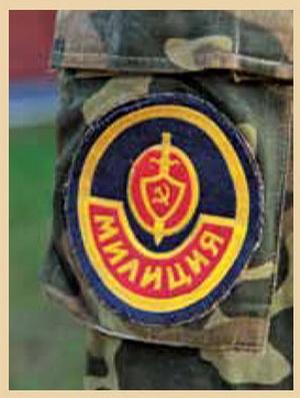
Marines commanders have warned that if someone tries to force to disarm the "black berets", then they will go to their rescue. About the same intentions stated several commanders of military units. Then in the Baltic army could easily get out of obedience to the president.
Rumor had it that the destruction of the Riga OMON was sent to the group "Alpha" of the KGB of the USSR and put notify neighbors Marines controlled the river, riot police informed observers on all vessels passing the possible "guests." Fortunately, the rumors were only rumors.
The division of internal troops (who submitted OMON) squad withdrew from the boiler allowance and took imparted APC. But sympathizers speaking citizens at night supplied the soldiers with food.
Soon after the Council of Ministers of Latvia to "bomb" the Kremlin with requests to relocate "those thugs" somewhere in Russia.
Lithuanian nationalists at this time blocked by riot police base in Vilnius. In extreme circumstances of his soldiers burned all his personal affairs.

an effort to keep the state in its previous borders, the CPSU Central Committee and the Government have taken specific measures in all the major cities have created special police units.
In October 1988 over the Soviet Union in the capitals of the Union republics appeared 24 special purpose police detachment. From the Baltic republics by some miracle, only the party leadership was able to convince the Estonian Ministry of Internal Affairs of the USSR there is no need to create a riot on its territory, "not to stifle the emerging democracies».
Second December 1988 the order № 206 of the Ministry of Interior of the USSR, including the Ministry of Internal Affairs of the Latvian SSR, Riga OMON was formed, numbering 150 people (including 20 officers and 2 Unverified employee).
Its task was to protect public order in major cities across the country, the elimination of mass disorder, public order during the period of any accidents or natural disasters, and the disarmament of illegal groups. In particular, the units subordinated to the Ministry of Interior the self-proclaimed Republic of Latvia, criminal gangs and arms dealers.
The first commander of the Riga OMON was appointed Lieutenant Colonel Edgar Ivanovich Limar. Previously, he headed the department in LOVDT on water transport of Riga city, and then - the headquarters patrol the city police department. With the formation of the Riga OMON was appointed its commander. About a year and a half after this appointment Edgar Limar retired.

In October 1990, a group of "special police" led by Major G. Czeslaw Mlynnik. Born Czeslaw G. July 28, 1960 in the village of Lugomovichi Grodno region Belarusian. In 1991, he graduated from Minsk Higher School of the USSR Ministry of Internal Affairs. (Veteran of the Afghan war, awarded the medal "For Courage" and "For Military Merit".) Prior to his appointment to the post of commander of the riot police, served as commander of operational troop platoon, and then - senior inspector of combat training.
In fact, the Soviet authorities in the Baltic countries have ceased to exist. But Moscow did not want to recognize the independence of Latvia, Lithuania, Estonia, and it has provoked severe political struggle, which was involved in the Riga OMON. Historians believe the main reason for all subsequent events - dual power, set in Latvia in May 1990.
On the one hand, the legally elected parliament and formed their government. On the other - anti-government coalition: the Communist Party of Latvia headed by the first secretary of Alfred Rubiks, Intermovement, the KGB and the Baltic Military District (its headquarters were in Riga).
Initially supported by a detachment of the new government. May 15, 1990, he became a hero in the eyes of the Latvian people. On this day, the first time the military attempted to overthrow the republican parliament. Staff of the Baltic Military District officers and plainclothes cadets of military schools stormed the parliament building. The government called the riot police, who easily beat back the offensive.
June 18, 1990 from the post of Minister of Internal Affairs was released Lieutenant General Bruno Shteynbrik, who comes from the KGB and member of the Central Committee of the CPL, created a riot police and riot police who could find a common language.
The new Minister of the Republic of Latvia - Police Colonel Alois Vaznis, former chief of the Criminal Investigation Department of the Republic, went on the conflict with the "black berets". Start Cleaning companies, and on a national basis - life in Riga did not guarantee the fighters obtain citizenship. And the Latvian language does not know everything.
The commander of the unit Lieutenant Colonel Edgar Limar Vaznis refused to submit and in the Communist Party newspaper "Soviet Latvia" declared that he would carry out only those orders that do not contradict the Constitution of the USSR and the Constitution of the Latvian SSR.

Then the new minister has forbidden to give rebellious riot police put him money, ammunition and fuel, and the Government of the Republic demanded from the Soviet Interior Ministry riot police to disband Riga.
But then-Interior Minister Vadim Bakatin at the request of Rubiks ("take into account the growth of separatist sentiment in the Baltic States") retained the squad reassign its 42 th Division of the Interior Ministry of the USSR (its headquarters are in Vilnius and two regiments - in Riga). Also Makarova guns, riot police were given the permanent wearing of machine guns, grenades, and the squad gave two new APCs.
December 3rd, 1990, the post of Bakatin Federal Minister of the Interior was replaced by former first secretary of the Latvian Communist Party, Boris Pugo. His first deputy was General Boris Gromov, formerly commander of the 40th Army in Afghanistan.
In the troubled times who is not only used police units in larger political games. Between a rock and a hard place and appeared Riga OMON.
In 1990 Latvia still declared independence. In these circumstances, the Riga OMON refused to swear allegiance to the new authorities and Mlynnik said that from now on will be subject only to the Minister of Internal Affairs Boris Pugo. Squad appeared abroad and practically outlawed.
Then in Riga was the representative of the Ministry of Interior of the USSR, to give orders directly to the Minister of Internal Affairs Command special purpose police detachment.
In January 1991, on the orders of the Ministry of Internal Affairs of the USSR and the Central Committee of the Communist Party of Latvia took the riot police and secured the printing house - publishing party, nationalized by the new government of Latvia. There separatists could print flyers and leaflets. The activity of this company was not paralyzed - the police for some time easy to control the printing press.
"In order to restore order and establish Soviet power in Riga, enough of our unit. We are ready to execute any order of the president. We hope that it will be soon - then said reporters riot police senior lieutenant Alexander Kuzmin. - Dispersal of the existing power, take custody of the strategic objects and arrange a trial nationalists ».
The new leadership of the USSR Interior Ministry tried to calm Vaznis, alarmed by the audacity of riot police. January 14, he received a telegram signed by Gromov: "... As you know, the part of the Federal Ministry of the measures taken to strengthen control over the operational activity unit ...»

But the same day (15 January), the riot police had disarmed the police station "Vecmilgravis" in Riga, and then the local department of the Minsk Higher School of the Ministry of Interior.
To the alarming situation in reserve Shteynbrik USSR Interior Ministry, he said: "... Such formation as riot police is dangerous for any government. Send commanders appointed from Moscow, riot police did not recognize. Mlynnik enjoys credibility, not characterized by restraint. The detachment is controlled by a special department of the KGB and the Baltic Military District. Their anarchism is dangerous. I do not rule out new attacks. I do not think they have someone's specific instructions, but do not rule out that they may throw out the information, provoking children to certain actions ».
According to the latest investigation began on January 16, riot police, fearing an attack on their base captured "Vecmilgravis" opened fire and accidentally killed the driver a passing car.
January 18 in Moscow took a report signed by Vaznis: "... me all the bodies and organs of Internal Affairs of the Republic of Latvia ordered in the case of intrusion attempts riot in buildings and premises of the Interior to open fire on them to kill».
But two days later riot police seized the building of the Ministry of Internal Affairs of the Republic of Latvia, where everything is stored weapons and documentation of its accounting. In this killed two police officers guarding the arsenal, the studio operator who filmed the incident on videotape, and bystanders.
As old-timers remember the special police, served as a pretext for the seizure of shelling patrol riot attire, riding on a duty shift. Narrow streets, the dark, and that the Bastion Hill, where the fire was fought by riot policemen, were dominating in height, can not effectively defend itself - I had to take a nearby building ... the republican Interior Ministry. During the shooting were a lot of onlookers, and stray bullets could easily catch someone.
Shootout ended as quickly as it began. "Examined - is not at war with anyone. Of collected weapons and left the building ... »

At the peak of the "black berets" in Latvia of the National Police was created Battalion "White Berets". In one of the encounters they surrendered without firing a shot. Riot militiamen disarmed the battalion taking away from the police uniforms, pistols and machine guns.
- Baltic States was actively separatism and created its economic border customs posts, - says the commander of the Tyumen Oleg Sidorchik riot.
Oleg Sidorchik native of Tallinn ... The police, Oleg went by conviction, but by this time in the Baltic States began a campaign of defamation of Russian-speaking population. "Aboriginal" after Russian, which, strictly speaking, kept the entire industry of the republic, are increasingly shouting insulting words and stadiums bawled nationalist songs. This "revolution" historians later called "singing».
- Expected romance PPP was not enough - and wanted to try yourself in the service of the OMON - recalls Sidorchik. Then about these newly created division went incredible rumors. Allegedly selected in the squad, both in space ...
In early 1991, Estonia in agreement with the Ministry of Internal Affairs of the USSR established its police from the actions of the police.
Estonians felt above his dignity to serve in the militia, and it is 90 percent composed of Russian, poor knowledge of the Estonian language. Commanders quietly offered Russian policemen sign paper sheets with obscure texts in Estonian. As it turned out - the oath of allegiance to the new Estonia. Sidorchik Estonian owned and did not rise to the bait.
Then, according to the separatists, open borders with Russia undermined the economy of the new Baltic States, and for their protection were involved Battalion Field Police (police patrol), in which Oleg Sidorchik served in the position of "senior kordnika" (senior patrol police). Refusing to guard the border, and he resigned after a meeting and talks with the Chief of Staff of the Riga OMON Valery Brovkin, in June 1991 she was admitted to the squad ...

Then the new Latvian authorities accuse the fighters in the shooting of seven Lithuanian customs post Medininkai on July 31, 1991. According to the version of the same investigation, participated in the attack Riga OMON soldiers with the assistance of their colleagues from Vilnius riot police, are also subject to the Ministry of Interior of the USSR.
January 25 about 500 policemen Riga garrison at its meeting in public and political center of the Central Committee of the CPL was supported by riot police and demanded the resignation of Vaznis.
Moscow television showed imbued with sympathy for the Riga OMON film "Our" then popular television journalist Alexander Nevzorov.
As a dedicated Riga OMON
At the beginning of January 1991 a number of senior representatives of the Central Committee of the CPSU and the Soviet government set up a self-proclaimed authority in the Soviet Union - the State Emergency Committee (Emergency Committee), who tried to forcibly remove MS Gorbachev from the post of President of the USSR, held them to change course and to disrupt the signing of the "Treaty on the Union of Sovereign States", scheduled for 20 August 1991, and thus prevent "legal" division of the country into separate states.
Since the end of 1990 and beginning of August 1991 members of the Emergency Committee had intended to introduce constitutional means a state of emergency.
Not having received the support of the president of the USSR and Supreme Soviet of the USSR, since the beginning of August 1991, they adopted unlawful, but concrete measures to prepare for the state of emergency.
Their essence is in isolation from the power of the president of the USSR, blocking possible attempts of the Russian Federation President (Boris Yeltsin) to resist the activities of the Emergency Committee, and the establishment of a permanent monitoring of heads of government of the RSFSR.
Emergency Committee hopes pinned to the aid of the Soviet Army and Interior Ministry special forces to storm the building of the Supreme Soviet of the RSFSR.
Option power to solve the problem of confrontation in Riga conspirators seemed more "successful" than the same test of strength in Vilnius, where on January 12 during the assault on the television station killed 13 people.

August 19, 1991 in Moscow, began a coup (the so-called "August" putsch), and Interior Minister Boris Pugo ordered the commander of the Riga OMON Czesław Mlynnik restore Soviet order in Riga.

As later recalled Mlynnik, "... on Monday, August 19 at 6 am was ordered Pugo open secret package ... And 8 hours later all the objects belonging to the category of special importance, were completely taken by us under control ...»
"Black Berets" five groups of 10-15 people on several specially sent combat army Mi-8 helicopter landed on the important objects and without firing a shot taken and secured the building of the City Department of Internal Affairs, Ministry of Interior, the television station on the island of Zakusala, long-distance telephone and telegraph station Dzirnavu street and the Latvian Radio Committee at the Dome Square.
On the morning of August 20 riot policemen handed over to take an object and army paratroopers with counterintelligence took up the search for weapons of separatists, but timely information on weapons proved to be false. By the evening of 20 August the Government of Latvia to hide in bunkers bomb shelters and returned to Riga Soviet power.
As a result of the riot police ousted all separatist forces. For two days the soldiers almost without firing a shot took control of all strategic facilities in Latvia. And while none of the separatists did not come out to rallies and demonstrations.
The activists of the Popular Front of Latvia (NFL) were scared and conscientiously fulfill all the orders of "invaders».
August 21 riot policemen were preparing to take control of the last object that was under the control of supporters of the NFL - the building of the Supreme Council of Latvia.
Dressed in a "citizen" and with folding machine guns under clothing riot policemen in groups of three or four people per car looking staffs DNDL ("Movement for National Independence of Latvia") and voluntary nationalist squads "Kartiga HKSAR." At headquarters they seized found nationalist literature and powerful means of communication on the basis of five brand new cars GAZ-66. These machines - mobile station is likely to have been stolen from abandoned military depots "emergency reserve».

At the headquarters of the special department of the county people he listened intently to the televised speech of Boris Yeltsin - in Moscow, has been all over with the Emergency Committee ...
The same day, Interior Minister Boris Pugo, the USSR committed suicide, and the Riga OMON and military from the Defense Ministry, meanwhile, continued to control the capital of Latvia. But then what to do, they did not know. Further guidance was not followed ...
Having received no support and a specific command, the soldiers, to the relief of the Latvian government, after three days returned to the barracks.
At its base at Riga OMON took perimeter defense, and offers guidance Latvia surrender fighters said they would shoot to the last bullet.
The Supreme Council of Latvia appealed to Moscow with a request to hand over the Riga OMON. The city is easy to Democrats agreed and gave the squad an indication of surrender. But the "black berets" refused. Then Marine Regiment, based on the other side of the Daugava River, from Moscow riot police followed orders to disarm.

Marines commanders have warned that if someone tries to force to disarm the "black berets", then they will go to their rescue. About the same intentions stated several commanders of military units. Then in the Baltic army could easily get out of obedience to the president.
Rumor had it that the destruction of the Riga OMON was sent to the group "Alpha" of the KGB of the USSR and put notify neighbors Marines controlled the river, riot police informed observers on all vessels passing the possible "guests." Fortunately, the rumors were only rumors.
The division of internal troops (who submitted OMON) squad withdrew from the boiler allowance and took imparted APC. But sympathizers speaking citizens at night supplied the soldiers with food.
Soon after the Council of Ministers of Latvia to "bomb" the Kremlin with requests to relocate "those thugs" somewhere in Russia.
Lithuanian nationalists at this time blocked by riot police base in Vilnius. In extreme circumstances of his soldiers burned all his personal affairs.
Tags
See also
The history of the Knights Templar (11 photos)
Top 10 most dangerous plant-killers (11 photos)
Gargoyles (25 photos)
15 incredible cloud formations (20 photos)
The photos that shocked the world (34 photos)
10 cases of global hunger, leading to cannibalism (14 photos)
Secrets of the Maginot Line (26 photos)
25 most annoying insects the world (25 photos)
The most famous fotofalsifikatsii (21 photos)
In 1988, in the territorial waters of the Soviet Union there was an incident between warships of the USSR and the USA.

